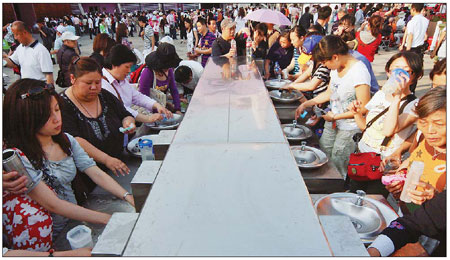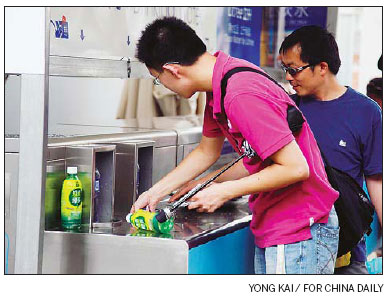Potable water stations for public spots
 |
| New technology gives Expo visitors access to free and drinkable water. [Xinhua/Wu Changqing] |

The technology powering the Expo's free drinking-water facilities may go citywide, Wang Hongyi reports.
The stations offering free and potable water in the Expo Garden may be extended to other parts of Shanghai such as bus stations, theaters and sports stadiums.
A concrete plan for installing the cutting-edge technology that powers the Expo's 158 fountains in other parts of the city is expected within a few months, according to media reports.
Tourists, who are not allowed to take drinks inside the Expo site for security reasons, consumed 100,000 tons of drinkable tap water by early September.
"Visitors to the Expo Garden have responded well to the tap waterBut before we do anything, we first have to think about the operational costs, long-term maintenance, site selection and such issues," said Zhu Chao, an official from the Bureau of Shanghai Expo Coordination.
Tap water in Shanghai cannot be drunk directly, compelling residents to boil it first or buy mineral water instead. This is because the water is treated using special coagulants for filtration and sterilization that can create harmful substances when chemically processed.
This new technology could revolutionize the city's drinking habits if implemented on a broader scale. It uses ultraviolet sterilization, and carbon-absorbing micro-molecules, to clean the water to international standards, according to Expo authorities.
"It filters out a variety of impurities from secondary pollution and ensures the water is safe," said Li Weiying, the Tongji University professor in charge of the Expo project.
A survey by the same university found that 64 percent of the Expo tourists surveyed would recommend the Expo tap water to their friends or relatives, while 76 percent would like to see such facilities in other public places.
"It's a newfangled gadget, but really convenient. Most importantly, it can save millions of plastic bottles," said a visitor surnamed Yang from Jiangxi province.
Li would like to see the stations taken to rural areas with poor sanitation conditions, but he is quick to stress that "a lot of work needs to be done if we're going to install such facilities for long-term use".
Zhu said that educating the public on the importance of conserving water supplies was another compelling reason to promote and spread the drinkable tap-water facilities.
Local residents agreed that a metropolis of Shanghai's stature has little choice but to go down this road.
"These kind of facilities are often seen in Western counties and they seem to bring many environmental benefits for the public. Shanghai is a major metropolis, so it should push this technology for the environment and for people's health," said a woman surnamed Qiao.
 0
0 






